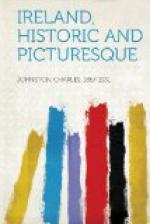The culture of Ireland, during the period before the Northern raids, bridged over the abyss between the classical and the mediaeval world. During the whole of that period the rest of Europe was hidden under the clouds of the Dark Ages. Ireland stood alone as the one cultured nation. Receiving the classical learning from Roman Gaul and Britain and Italy, while the old world was still alive, Ireland carried that culture onward when Rome and the Roman Empire fell, crushed under the hordes of Northern barbarians: the Franks in Gaul; the Lombards, Goths and Vandals in Spain and Italy; the Angles, Saxons and Danes in Britain; and the Picts and Northmen in the Scottish lowlands. Austria was meanwhile overrun by Asian nomads, the Huns and Magyars; Russia and Germany, with the Scandinavian lands, were still pagan.
Thus all Europe was submerged under a deluge of heathenism, and the old Latin culture was swept away. The tradition of ancient Greece still lingered at Constantinople behind the wall of the Balkans, but it had no influence at all on the northern nations beyond the wall. Ireland was thus the one exception, the ark of safety for the old wisdom and beauty of classical days. And from Ireland, when the tide of heathen invasion slackened, the light of classical times and the spirit of the New Way went forth to all the nascent nations, the great pagan tribes that were to form the modern world. Thus Ireland was the bridge over the Dark Ages, the first of modern nations, keeping the old and blending it with the new.
Yet another view of Ireland’s significance must not be forgotten. Of the original life of the great pagan world which swept over the Roman Empire we know almost nothing. How much do we realize of the thought and genius of Aleman, Frank and Vandal, of Angle and Lombard and Burgundian?
Nothing at all. The darkness that shrouds them is complete. But what a contrast when we come to Ireland! If we leave out the basin of the Mediterranean, with its Asian and African traditions, Ireland is the one European nation which has clear records of its pagan history. And how excellent that history was, how full of humanity and the rich wine of life, the stories of Fergus and Concobar and Cuculain, of Find and Ossin and Gael, of Meave and Deirdre and Crede bear sufficient witness. The tide of Irish life to which they belong, and which brought them forth, flowed on without break to a time so recent that their whole tradition has come down to us, practically at first hand, from the heralds and bards themselves. Ireland is, therefore, our one doorway to the history of northern Europe through the long era of pagan times.
That history was everywhere a fierce tale of tribal warfare. Its heroes are valiant fighters, keen leaders of forays, champion swordsmen and defenders of forts. The air throbs to the battle-drum, rings to the call of the war-trumpet. Every tribe, every clan, is in turn victor and vanquished, raider and victim of raids. Everywhere are struggle and unrest, tales of captivity and slaughter.




